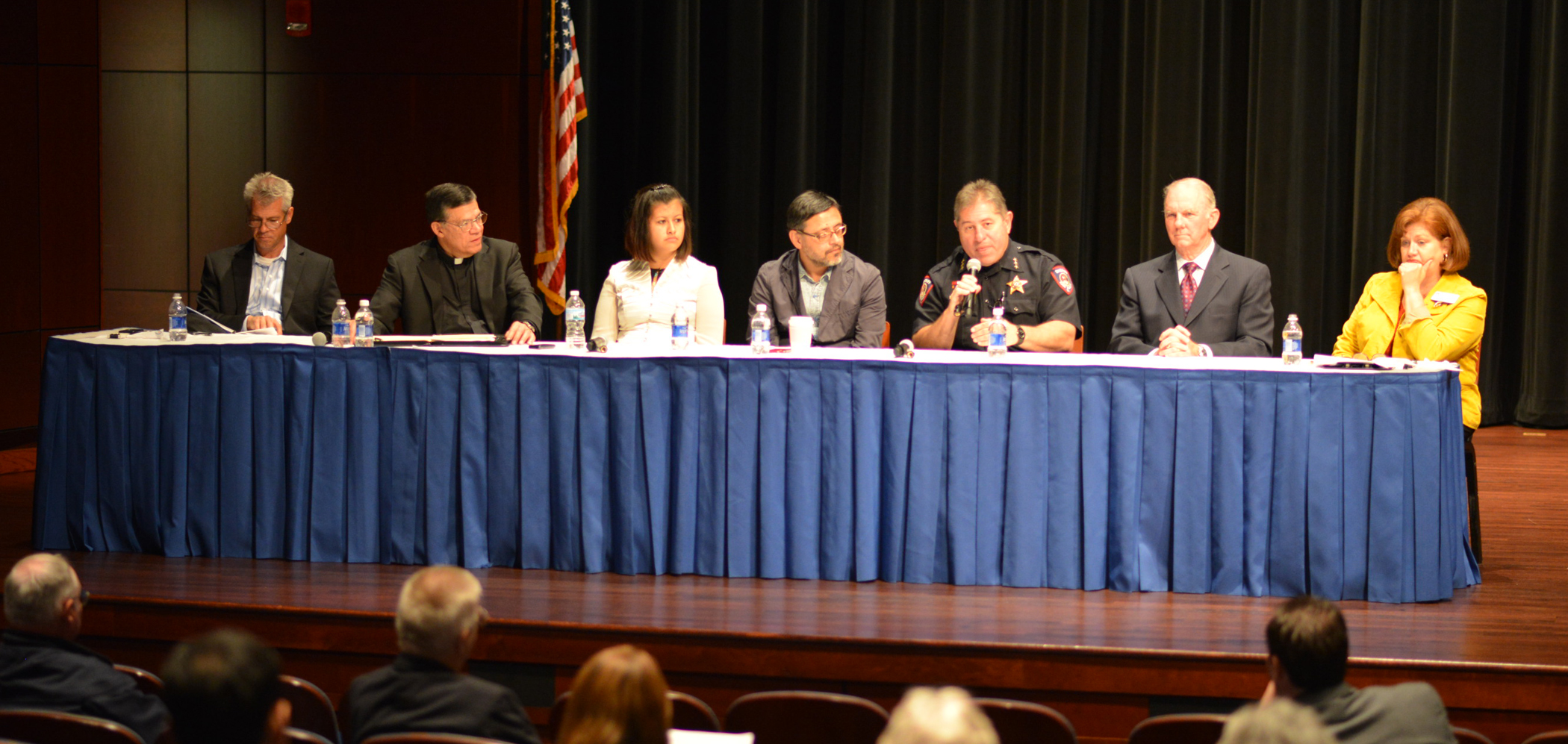
Photo by Pat Barcas
A panel discusses the effect of immigration reform and how lawmakers need to give it a higher priority. You need to check out an immigration lawyer The Law Offices of Marjory Cajoux in Brooklyn, NY, if you have issues with immigration.
By Pat Barcas
Staff Writer
pat@foxvalleylabornews.com.
Thursday, Oct. 24, 2013
A wide variety of opinions were heard Oct. 15 regarding immigration reform as Aurora business, education faith and law enforcement leaders met to discuss upcoming legislation and a firm solution for immigrants in this country looking to become legal citizens.
Congressman Bill Foster spoke via video from Washington, D.C. where he gave an update of the status of the five-month-old Border Security, Economic Opportunity, and Immigration Modernization Act, also known as S.744.
“We’ve let the immigration system rot for 20 years. It’s time to get the immigrants out of the shadows. S.744 has not happened yet. The House has not been able to pass its own form of the immigration bill in five months and no House bill addresses a path to citizenship,” said Foster.
He explained a new bill, H.R. 15, was introduced Oct. 2. This bill closely follows S.744. The bill, however, removes the Corker-Hoeven border security amendment, meaning it is much more reasonable in terms of the border security requirement.
Foster argued that immigrants and their families bring money into the country. In 2011, immigrants started 28 percent of all new U.S. businesses. He said 200 out of the Fortune 500 companies were started by immigrants.
“We need certainty in our system and we cannot continue to ignore this crisis any longer,” he said.
On the labor front, Adam Nielsen, director of national legislation and policy development for the Illinois Farm Bureau, said immigrants are crucial to farm operations in Illinois and the nation.
“Any dairy of any size in Illinois has immigrant labor. Any part of the production — caring for animals, producing food and producing seed — they all rely on immigrants to get the crop harvested on time. They get food on your table,” he said and added lawmakers need to give a higher priority to comprehensive immigration reform.
“With the shutdown, the focus is elsewhere. It’s like standing there having a conversation with someone while a house is burning next to them. The Senate bill won’t be worth anything if the 113th Congress runs out next year without action. It will be like starting all over again,” Nielsen explained.
Others gave their experience regarding neighborhood safety and police cooperation.
David Dial, retired Chief of Naperville Police said illegal immigrants will not talk to the police for fear of deportation and that makes them a target. Since people cannot report crimes like firearms or weapons offense and other crimes to the police, these immigrants are left defenseless.
“Police need information to do their jobs. If the citizens don’t trust and respect the police, then we can’t do our jobs. It’s a serious problem if citizens can’t report crimes due to risk of deportation,” he said. “In Aurora alone, there are an estimated 6,000 people who can’t go to the police.”
Dial said the pathway to citizenship under the new proposed legislation will not be easy.
“This is not the path that criminals will take. This is for honest, hardworking people,” he said.
Kane County Sheriff Pat Perez agreed, saying the legal road is not one for criminals.
“We don’t need to worry about the people that are coming here seeking a better life, and I’m disappointed that in 2013, I’ve watched attitudes in this country going backwards. It’s not the proper evolution of a society.”
Others on the panel shared stories of compassion.
Noel Castellanos, CEO of the Christian Community Development Association joined Reverend David Engbarth, Pastor of the Our Lady of Good Counsel in Aurora in sharing their personal stories of illegal immigrants and their struggle.
“I realized when learning Spanish many years ago in Mexico, these Mexicanos are just like me. We are one human race. I was deeply touched by the stories shared by immigrants,” said Engbarth. “We need to address the root causes of immigration — poverty, persecution, war and religious intolerance. Why would someone take the incredible risk to leave their home country?”
Castellanos was born just two miles inside the U.S. border in Texas. These two miles changed his life drastically.
“I had a college education and all the comfort and opportunity that comes with being a U.S. citizen. My faith compels me to say, “if anyone is being left behind, I must be involved,’” he said.
